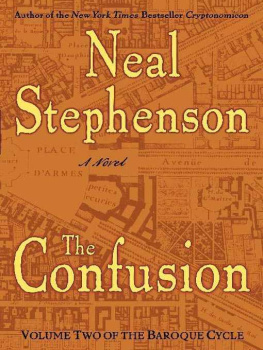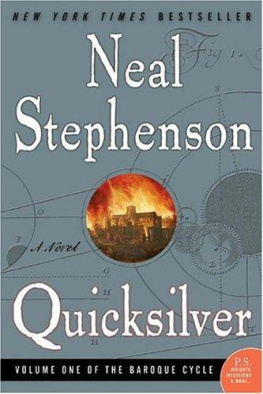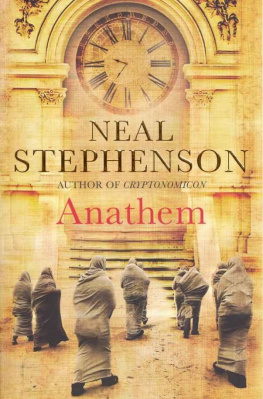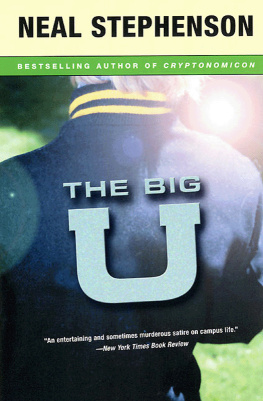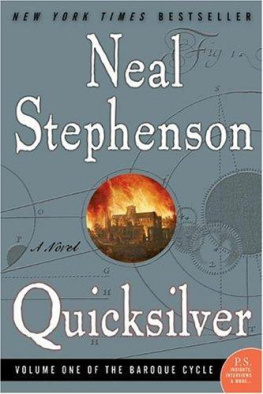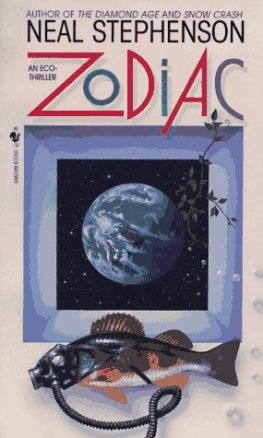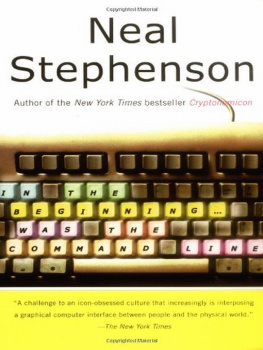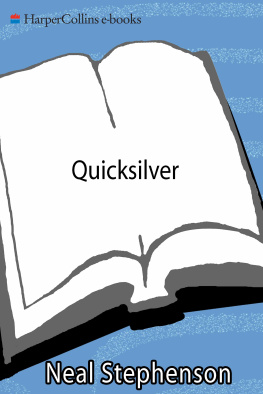Neal Stephenson - THE System OF THE WORLD
Here you can read online Neal Stephenson - THE System OF THE WORLD full text of the book (entire story) in english for free. Download pdf and epub, get meaning, cover and reviews about this ebook. genre: Science fiction / Romance novel. Description of the work, (preface) as well as reviews are available. Best literature library LitArk.com created for fans of good reading and offers a wide selection of genres:
Romance novel
Science fiction
Adventure
Detective
Science
History
Home and family
Prose
Art
Politics
Computer
Non-fiction
Religion
Business
Children
Humor
Choose a favorite category and find really read worthwhile books. Enjoy immersion in the world of imagination, feel the emotions of the characters or learn something new for yourself, make an fascinating discovery.

- Book:THE System OF THE WORLD
- Author:
- Genre:
- Rating:3 / 5
- Favourites:Add to favourites
- Your mark:
- 60
- 1
- 2
- 3
- 4
- 5
THE System OF THE WORLD: summary, description and annotation
We offer to read an annotation, description, summary or preface (depends on what the author of the book "THE System OF THE WORLD" wrote himself). If you haven't found the necessary information about the book — write in the comments, we will try to find it.
THE System OF THE WORLD — read online for free the complete book (whole text) full work
Below is the text of the book, divided by pages. System saving the place of the last page read, allows you to conveniently read the book "THE System OF THE WORLD" online for free, without having to search again every time where you left off. Put a bookmark, and you can go to the page where you finished reading at any time.
Font size:
Interval:
Bookmark:
Neal Stephenson
THE System OF THE WORLD
VOL. III of
THE BAROQUE CYCLE
To Mildred
Contents
Solomons Gold
Currency
The System of the World
But first whom shall we send
In search of this new world, whom shall we find
Sufficient? Who shall tempt with wandring feet
The dark unbottomd infinite Abyss
And through the palpable obscure find out
His uncouth way, or spread his aerie flight
Upborn with indefatigable wings
Over the vast abrupt, ere he arrive
The happy Ile
MILTON, Paradise Lost
In Boston in October 1713, Daniel Waterhouse, sixty-seven years of age, the Founder and sole Fellow of a failing college, the Massachusetts Bay Colony of Technologickal Arts, has received a startling visit from the Alchemist Enoch Root, who has appeared on his doorstep brandishing a summons addressed to Daniel from Princess Caroline of Brandenburg-Ansbach, thirty.
Two decades earlier, Daniel, along with his friend and colleague Gottfried Wilhelm von Leibniz, knew Princess Caroline when she was a destitute orphan. Since then she has grown up as a ward of the King and Queen of Prussia in the Charlottenburg Palace in Berlin, surrounded by books, artists, and Natural Philosophers, including Leibniz. She has married the Electoral Prince of Hanover, George Augustus, known popularly as Young Hanover Brave for his exploits in the recently concluded War of the Spanish Succession. He is reputed to be as handsome and dashing as Caroline is beautiful and brilliant.
The grandmother of George Augustus is Sophie of Hanover, still shrewd and vigorous at eighty-three. According to the Whigs-one of the two great factions in English politics-Sophie should be next in line to the English throne after the death of Queen Anne, who is forty-eight and in poor health. This would place Princess Caroline in direct line to become Princess of Wales and later Queen of England. The Whigs bitter rivals, the Tories, while paying lip service to the Hanoverian succession, harbor many powerful dissidents, called Jacobites, who are determined that the next monarch should instead be James Stuart: a Catholic who has lived most of his life in France as a guest and puppet of the immensely powerful Sun King, Louis XIV.
England and an alliance of mostly Protestant countries have just finished fighting a quarter-century-long world war against France. The second half of it, known as the War of the Spanish Succession, has seen many battlefield victories for the Allies under the generalship of two brothers in arms: the Duke of Marlborough and Prince Eugene of Savoy. Nevertheless France has won the war, in large part by outmaneuvering her opponents politically. Consequently, a grandson of Louis XIV now sits on the throne of the Spanish Empire, which among other things is the source of most of the worlds gold and silver. If the English Jacobites succeed in placing James Stuart on the English throne, Frances victory will be total.
In anticipation of the death of Queen Anne, Whiggish courtiers and politicians have been establishing contacts and forging alliances between London and Hanover. This has had the side-effect of throwing into high relief a long-simmering dispute between Sir Isaac Newton-the preeminent English scientist, the President of the Royal Society, and Master of the Royal Mint at the Tower of London-and Leibniz, a privy councilor and old friend of Sophie, and tutor to Princess Caroline. Ostensibly this conflict is about which of the two men first invented the calculus, but in truth it has deeper roots. Newton and Leibniz are both Christians, troubled that many of their fellow Natural Philosophers perceive a conflict between the mechanistic world-view of science and the tenets of their faith. Both men have developed theories to harmonize science and religion. Newtons is based on the ancient proto-science of Alchemy and Leibnizs is based on a theory of time, space, and matter called Monadology. They are radically different and probably irreconcilable.
Princess Caroline wishes to head off any possible conflict between the worlds two greatest savants, and the political and religious complications that would ensue from it. She has asked Daniel, who is an old friend of both Newton and Leibniz, to journey back to England, leaving his young wife and their little boy in Boston, and mediate the dispute. Daniel, knowing Newtons vindictiveness, sees this as foreordained to fail, but agrees to give it a try, largely because he is impoverished and the Princess has held out the incentive of a large life insurance policy.
Daniel departs from Boston on Minerva, a Dutch East Indiaman (a heavily armed merchant ship). Detained along the New England coast by contrary winds, she falls under attack in Cape Cod Bay from the formidable pirate-fleet of Captain Edward Teach, a.k.a. Blackbeard, who somehow knows that Dr. Waterhouse is on board Minerva, and demands that her Captain, Otto Van Hoek, hand him over. Captain Van Hoek, who loathes pirates even more than the typical merchant-captain, elects to fight it out, and bests Teachs pirate fleet in a day-long engagement.
Minerva crosses the Atlantic safely but is caught in a storm off the southwest corner of England and nearly cast away on the Isles of Scilly. Late in December she puts in at Plymouth for repairs. Dr. Waterhouse goes ashore intending to travel to London by land. In Plymouth he encounters a family friend named Will Comstock.
Will is the grandson of John Comstock, a Tory nobleman who fought against Cromwell in the middle of the previous century and, after the Restoration, came back to England and helped found the Royal Society. Subsequently, John was disgraced and forced to retire from public life, partly through the machinations of his (much younger) distant cousin and bitter rival, Roger Comstock. Daniel served as a tutor in Natural Philosophy to one of the sons of John. This son later moved to Connecticut and established an estate there. Will was born and grew up on that estate but has lately moved back to England, where he has found a home in the West Country. He is a moderate Tory who has recently been created Earl of Lostwithiel. Queen Anne has recently been forced to create a large number of such titles in order to pack the House of Lords with Tories, the party that she currently favors.
Daniel has spent the twelve days of Christmas with Wills family at his seat near Lostwithiel, and Will has talked him into making a small detour en route to London.
Dartmoor
15 JANUARY 1714
In life there is nothing more foolish than inventing.
-JAMES WATT
MEN HALF YOUR AGE and double your weight have been slain on these wastes by Extremity of Cold, said the Earl of Lostwithiel, Lord Warden of the Stannaries, and Rider of the Forest and Chase of Dartmoor, to one of his two fellow-travelers.
The wind had paused, as though Boreas had exhausted his lungs and was drawing in a new breath of air from somewhere above Iceland. So the young Earl was able to say this in matter-of-fact tones. Mr. Newcomen and I are very glad of your company, but-
The wind struck them all deaf, as though the three men were candle-flames to be blown out. They staggered, planted their downwind feet against the black, stony ground, and leaned into it. Lostwithiel shouted: Well not think you discourteous if you return to my coach! He nodded to a black carriage stopped along the track a short distance away, rocking on its French suspension. It had been artfully made to appear lighter than it was, and looked as if the only thing preventing it from tumbling end-over-end across the moor was the motley team of draught-horses harnessed to it, shaggy manes standing out horizontally in the gale.
I am astonished that you should call this an extremity of cold, answered the old man. In Boston, as you know, this would pass without remark. I am garbed for Boston. He was shrouded in a rustic leather cape, which he parted in the front to reveal a lining pieced together from the pelts of many raccoons. After that passage through the intestinal windings of the Gorge of Lyd, we are all in want of fresh air-especially, if I read the signs rightly, Mr. Newcomen.
Font size:
Interval:
Bookmark:
Similar books «THE System OF THE WORLD»
Look at similar books to THE System OF THE WORLD. We have selected literature similar in name and meaning in the hope of providing readers with more options to find new, interesting, not yet read works.
Discussion, reviews of the book THE System OF THE WORLD and just readers' own opinions. Leave your comments, write what you think about the work, its meaning or the main characters. Specify what exactly you liked and what you didn't like, and why you think so.

